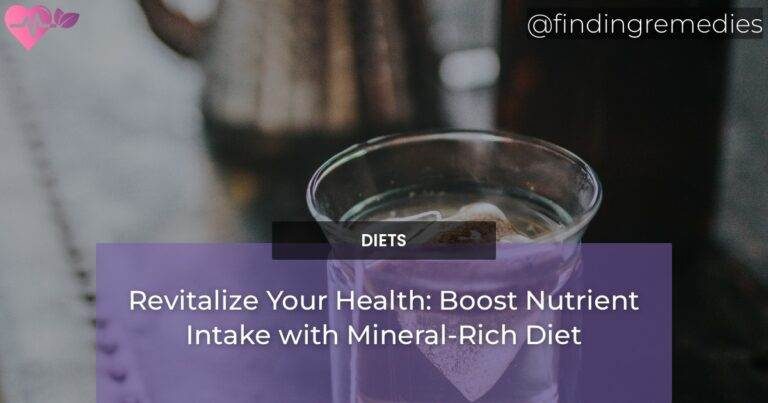Getting the right vitamins and minerals to support a healthy lifestyle is key to feeling energized and revitalized. Eating a diet full of nutrient-rich and mineral-dense foods is a great way to do this. Eating a healthy, vitamin- and mineral-rich diet is the perfect start to invigorating and restoring your health. It may even help improve the overall functioning of every organ in the body. Doing so can help you to lead a healthier and more productive life. It may encourage a stronger immune system, better quality sleep, improved cardiovascular health, and enhanced muscle and joint health.
This blog post will discuss ways to boost nutrient intake with a mineral-rich diet and how this can play an important role in restoring your health and promoting overall wellness.
Importance of Minerals
Minerals are essential nutrients that our bodies need to function properly. They are inorganic substances that our bodies cannot produce on their own, so we must get them from the foods we eat or from supplements. There are two categories of minerals: macrominerals and trace minerals. While we need macrominerals in larger amounts, trace minerals are also important for various functions in our bodies.
Some of the essential minerals include calcium, iron, zinc, magnesium, potassium, sodium, selenium, copper, and phosphorus.
Table of Contents
Examples of Mineral Deficiencies
Mineral deficiencies can cause a range of health problems, and some are more common than others. Common mineral deficiencies include:
- Iron deficiency
- Calcium deficiency
- Zinc deficiency
- Magnesium deficiency
- Potassium deficiency
Symptoms of mineral deficiencies vary depending on the type of mineral, but can include fatigue, weakness, anemia, brittle bones, and a weakened immune system.
The Role of Minerals in the Body
Minerals play a crucial role in various bodily functions. For example:
- Calcium is important for bone health and muscle function
- Iron is necessary for carrying oxygen throughout the body
- Zinc is important for immune function and wound healing
- Magnesium is involved in over 300 enzymatic reactions in the body
- Potassium helps regulate fluid balance and blood pressure
If we don’t get enough minerals, our bodies can’t perform these functions optimally, which can lead to health problems.
Best Sources of Minerals
There are many mineral-rich foods that we can incorporate into our diets. Some of the best sources of minerals include:
- Iron-rich foods: red meat, poultry, seafood, beans, nuts, and fortified cereals
- Calcium-rich foods: dairy products, leafy greens, tofu, and fortified foods
- Zinc-rich foods: oysters, beef, poultry, beans, and nuts
- Magnesium-rich foods: leafy greens, nuts, seeds, whole grains, and beans
- Potassium-rich foods: bananas, sweet potatoes, spinach, beans, and avocados
Incorporating these foods into our diets can help ensure that we get enough essential minerals.
Benefits of a Mineral-Rich Diet
A diet rich in minerals can provide many health benefits. For example:
- Improved bone health
- Reduced risk of anemia
- Better immune function
- Improved heart health
- Better digestion
A mineral-rich diet can also reduce the risk of certain health conditions, such as osteoporosis and high blood pressure.
Risks of Mineral Deficiencies
Mineral deficiencies can lead to a range of health problems, including:
- Increased risk of infections
- Bone loss
- Anemia
- Impaired immune function
- Heart problems
In severe cases, mineral deficiencies can be life-threatening.
Mineral Supplements
If you’re unable to get enough minerals from your diet, supplements can be a good option. However, it’s important to choose the right type of supplement and to talk to your doctor before starting any supplements.
There are many different types of mineral supplements, including multivitamins, individual mineral supplements, and chelated minerals. Some minerals are better absorbed in certain forms, so it’s important to choose the right supplement for your needs.
Conclusion
Incorporating a variety of nutrient-rich foods into your diet is the best way to ensure that you’re getting all the essential minerals your body needs. A balanced, plant-based diet can provide many of the minerals your body needs for optimal health. If you suspect you have a mineral deficiency or are considering supplements, talk to your doctor to determine the best course of action.

